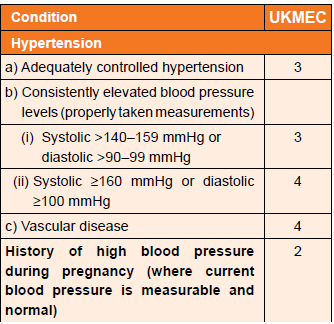Oral contraceptives and hypertension
- evidence suggests that combined oral contraceptive pill (COC) has a small adverse effect on blood pressure with average increases of 5/3 mmHg (1)
- severe hypertension may be induced by the COC in a small minority of women
- in respect of the progestogen only contraceptive pill (POP) observational data suggests that these do not induce an increase in blood pressure (1)
- Blood pressure: Women with severe hypertension (systolic pressure >= 160 mmHg or diastolic pressure >= 100 mmHg) should not use CHC (combined hormonal contraceptive) (UKMEC 4) (2)
- women with less severe hypertension (systolic pressure 140–159 mmHg or diastolic pressure 90–99 mmHg), or with adequately controlled hypertension should not use CHC (UKMEC 3)
- blood pressure should therefore be evaluated before initiating CHC

Check the British National Formulary for uptodate guidance regarding the use of the combined oral contraceptive pill in patients who are already hypertensive or develop hypertension during the use of the combined oral contraceptive.

Notes (3):
- the newer progestins such as drospirenone, with anti-mineralocorticoid diuretic effects, produce lower blood pressure. In a study of 120 women randomized to drospirenone progetin component OC or levonorgestrel component COC, the drospirenone group demonstrated a mean decrease in the systolic blood pressure (from 107.4 to 103.5 mm Hg), and had a statistically significant lower group mean blood pressure compared with the levonorgesterol group
Reference:
- Williams B, Poulter NR, Brown MJ, Davis M, McInnes GT, Potter JP, Sever PS and Thom S McG; The BHS Guidelines Working Party Guidelines for Management of Hypertension: Report of the Fourth Working Party of the British Hypertension Society, 2004 - BHS IV. Journal of Human Hypertension 2004; 18: 139-185.
- FSRH (July 2019). Combined Hormonal Contraception
- Shufelt CL, Bairey Merz CN. Contraceptive hormone use and cardiovascular disease. J Am Coll Cardiol. 2009 Jan 20;53(3):221-31.
Related pages
Create an account to add page annotations
Add information to this page that would be handy to have on hand during a consultation, such as a web address or phone number. This information will always be displayed when you visit this page